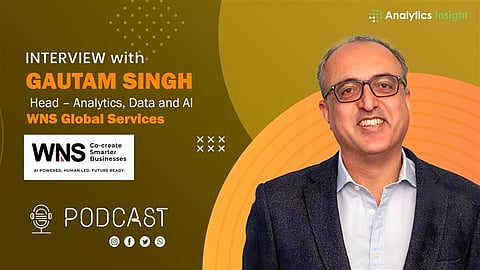

Process automation has come a long way over these years from simple rule-based tasks. Agentic AI allows systems to adapt to changes, resolve problems proactively, optimize performance, and in some cases even collaborate with human agents.
In the latest Analytics Insight podcast, host Priya Dialani speaks to Gautam Singh, Head of Analytics, Data, and AI at WNS Global Services, about how agentic AI is driving transformation across industries.
Priya introduces the topic, explaining the rapid evolution from predictive analytics to generative AI and now to agentic systems that can make real-time decisions. The head of analytics at WNS highlights that agentic AI shifts companies from capital-intensive digital transformation to outcome-focused operations.
“Agentic AI is not just about automation—it’s about systems taking initiative, making goal-based decisions, and helping humans make smarter choices,” says Gautam.
In Gautam's words, traditional automation finds its use but is limited to repetitive and predictable kinds of tasks. Agentic AI, in contrast, operates in a complex environment where Advanced Analytics and AI are deeply embedded in business processes, rather than running alongside them.
Services in WNS are productized: reimagined processes powered by AI and analytics, executed through scalable platforms with optimized user experiences. It is a far cry from the old model of outsourcing, entirely a labor cost arbitrage play, and now at its apogee of efficiency, intelligence, and constant optimization.
According to the head of analytics at WNS, agentic AI has broad applicability, but specific sectors will see immediate benefits:
Insurance: Automating complex claims and risk assessment.
Legal and Investment Research: Accelerating research-dependent decision-making.
Life Sciences & Healthcare: Improving drug development, diagnostics, and hospital operations.
Recruitment & Executive Search: Candidate matching and evaluation.
Gautam emphasized that industry type is not the sole factor to consider when it comes to success. It is the mindset of senior leadership and willingness to embrace agentic AI that determines success.
WNS's businesses focus on embedding data, analytics, and AI into business processes using automated, optimized processes that are outcome-driven for their clients around the world. Singh believes that this approach lends companies relevance in the competition and lays the groundwork for the next generation of intelligent operations.
As Gautam Singh concludes, “In 2025, agentic AI isn’t just a tool—it’s the engine driving smarter, adaptive, and collaborative business processes.”
